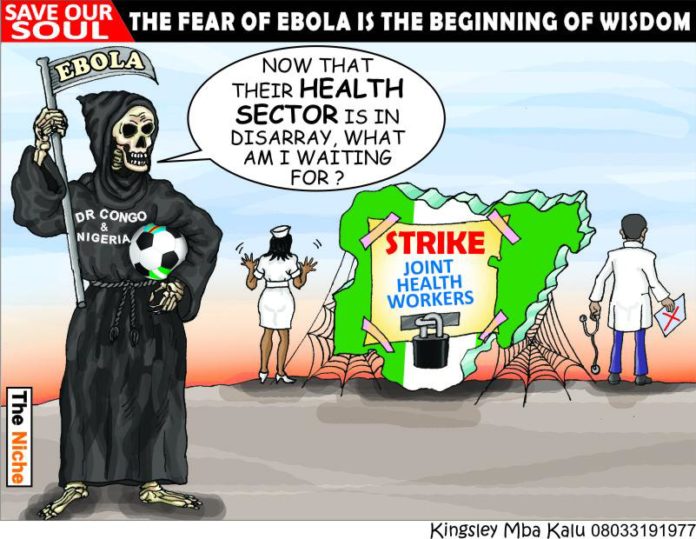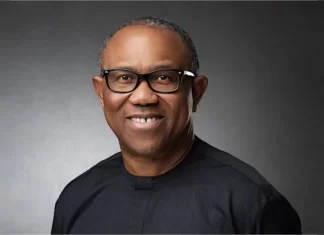Once again, Nigeria’s health sector is at the crossroads, almost comatose, because of the industrial action embarked upon by members of the Joint Health Sector Unions (JOHESU).
The strike which commenced on April 17, 2018, has paralysed health institutions across the country, resulting in avoidable deaths.
Many patients have been discharged prematurely, probably to go home and die, an action which is not only unwholesome and negates the ethics of the medical profession but also sabotages the core responsibility of government – protection lives.
Entreaties from well-meaning Nigerians that the striking workers should go back to work have been spurned.
The incorporated trustees of Kingdom Human Rights Foundation International (KFHRI) sued the striking unions and on May 17, 2018, the President of the National Industrial Court, Justice Babatunde Adejumo, sitting in the Abuja Division of the court, granted KFHRI’s ex-parte application by ordering the principal officers and representatives of JOHESU to suspend the strike within 24 hours. That order was also ignored.
Unfortunately, this crisis is not about how to revamp the country’s grossly dilapidated healthcare infrastructure, but a supremacy battle between medical doctors and other healthcare workers.
Though JOHESU tabled a 15-point demand to the Federal Government seeking significant improvements in terms of the conditions of service through increasing the retirement age of health workers to 65, like the government did in the education sector, the major issue is their resolute demand to be at par with and enjoy the same internship arrangements as medical doctors.
That is why the crisis has become intractable because the medical doctors are threatening to embark on their own strike if the demand for parity is met.
The government itself has said the quest for parity is neither practicable nor acceptable even as it promises adjustment of salaries and wages of health workers.
“What JOHESU is asking for is parity with medical doctors, which is neither practicable nor acceptable to the federal government,” the Minister of Health, Prof. Isaac Adewole, said in a statement issued by the Assistant Director of Information, Olajide Oshundun.
This back and forth is unnecessary. Nigerians who don’t have the resources to travel abroad on medical tourism should not be made the proverbial grass that bears the brunt of the fight by the medical sector elephants – NMA and JOHESU.
There is an urgent need for a lasting solution to the frequent, albeit needless, rivalry between doctors and other workers in the health sector.
While the need for enhanced emoluments and improved conditions of service cannot be overemphasized, JOHESU should also be realistic enough to appreciate the impracticability of the linear parity it is seeking.
That does not mean that members are by any means inferior to the medical doctors, who, in any case, cannot do the job alone.
Therefore, the arrogance that has characterized doctors’ relationship with other health workers must stop for industrial harmony to reign in the sector.
Besides, Nigeria must adequately fund the health sector which has been grossly underfunded for so long.
The country has disgracefully ignored the commitment it made alongside other African countries 17 years ago on funding of health care services for its citizens when it hosted the Heads of State of member countries of the African Union (AU) in 2001.
African leaders at the summit tagged “Abuja Declaration” pledged to commit at least 15 per cent of their annual budgets to improving their health sectors.
Since the declaration, Nigeria has not attained the pledged funding benchmark as the federal government has never voted more than six per cent of its annual budget to the health sector.
The highest percentage since the declaration was in 2012 with a 5.95 per cent allocation.
President Muhammadu Buhari allocated a paltry N340.45 billion to the health sector, representing 3.9 per cent of the N8.6 trillion 2018 Budget proposal he presented to the National Assembly in November last year.
The allocation is less than the 4.16 per cent and 4.23 per cent made to the health sector by the administration in the 2017 and 2016 budgets respectively.
Ironically, while the country’s overall budget has grown exponentially by 92 per cent from N4.49 trillion in 2015 to N8.621 trillion in 2018, its health budget has fallen by 14 per cent.
Compared to South Africa, the two countries are worlds apart when it comes to caring for citizens’ health.
While South Africa has spent $46 billion on health between 2014 and 2017, Nigeria has only managed $3 billion within the period.
This is despite the fact that Nigeria is home to an estimated 196 million people, which is more than three times the size of South Africa’s 55 million population.
In 2018, South Africa estimated its expenditure on health to be $14 billion USD, which accounted for 12 per cent of its budget, according to Treasury.gov.za.
In all, South-Africa has grown its health allocation by 27 per cent to $14 billion in 2018 from $11 billion in 2015.
Agreed there is no better time to shut down a country’s health sector because we are dealing with matters of life and death, but it is even more so now that the dreaded Ebola epidemic has resurfaced in the Congo Democratic Republic.
It will be a tragedy if the country is caught off-guard just because health workers are embroiled in a supremacy contest.














